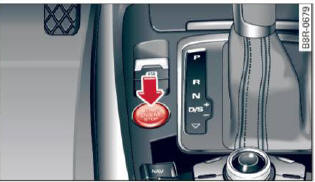Audi Q5: Convenience key
Starting the engine
Applies to vehicles: with Convenience key
The .png) button switches
the
ignition on and starts the engine.
button switches
the
ignition on and starts the engine.

Fig. 102 Center console : START ENGINE STOP button
Starting the engine
- Hybrid drive: refer to the information for starting the vehicle under.
- Step on the brake pedal and move the selector lever to P or N.
- Press on the
.png) button
> fig. 102 - the engine will start.
button
> fig. 102 - the engine will start. - It is possible that there will be a slight delay
when starting the engine for diesel vehicles in
colder temperatures. Therefore, you must hold
the brake pedal down until the engine starts.
The indicator lamp
.png) illuminates
when the engine is preheated.
illuminates
when the engine is preheated.
Switching the ignition on/off
If you would like to switch the ignition on without starting the engine, follow these steps:
- Press the
.png) button without
pressing the brake pedal.
button without
pressing the brake pedal. - To switch the ignition off, press the button again.
Diesel vehicles are preheated while the ignition is switched on.
When starting the engine, major electrical loads are switched off temporarily.
If the engine should not start immediately, the starting process is automatically stopped after a short time. Repeat starting procedure.
WARNING
- Never allow the engine to run in confined spaces - danger of asphyxiation.
- Always take the key with you whenever you
leave your vehicle. Otherwise, the engine
could be started or electrical equipment
such as the power windows could be operated.
This can lead to serious injury.
- Never leave children or persons requiring assistance unattended in the vehicle. The doors can be locked using the remote transmitter, preventing people from escaping from the vehicle on their own in the event of an emergency. Depending on the time of year, people inside the vehicle can be exposed to very high or very low temperatures.
Note
Avoid high engine rpm, full throttle and heavy engine loads until the engine has reached operating temperature - otherwise you risk engine damage.
For the sake of the environment
Do not let the engine run while parked to warm up. Begin driving immediately. This reduces unnecessary emissions.
Tips
- After starting a cold engine, there may be a brief period of increased noise because the oil pressure must first build up in the hydraulic valve adjusters. This is normal and not a cause for concern.
- If you leave the vehicle with the ignition switched on, the ignition will switch off after a certain period of time. Please note that electrical equipment such as exterior lights will switch off as well when that happens.
Switching engine off
Applies to vehicles: with Convenience key
- Bring your vehicle to a complete stop.
- Move the selector lever to the P or N position.
- Press the
.png) button
> fig. 102.
button
> fig. 102.
Steering lock
The steering locks when you turn the engine off
using the .png) button and open
the driver's door. The locked steering helps prevent vehicle theft.
button and open
the driver's door. The locked steering helps prevent vehicle theft.
Emergency off
If necessary, the engine can be switched off with the selector lever in the R
or D/S position. The engine stops if you press and hold the .png) button at speeds below 6 mph (10 km/h) and press the brake pedal.
button at speeds below 6 mph (10 km/h) and press the brake pedal.
WARNING
- Never turn off the engine before the vehicle has come to a complete stop. The full function of the brake booster and the power steering is not guaranteed. You must use more force to turn or brake if necessary. Because you cannot steer and brake as you usually would, this could lead to crashes and serious injuries.
- For safety reasons, you should always park your vehicle with the selector lever in P. Otherwise, the vehicle could inadvertently roll away.
- The radiator fan can continue to run for up to 10 minutes even after you have turned off the engine and removed the ignition key. The radiator fan can also turn on again if the engine coolant heats up because of intense sunlight or heat build-up in the engine compartment.
- Always take the key with you whenever you leave your vehicle. Otherwise, the engine could be started or electrical equipment such as the power windows could be operated. This can lead to serious injury.
- Never leave children or persons requiring assistance unattended in the vehicle. The doors can be locked using the remote transmitter, preventing people from escaping from the vehicle on their own in the event of an emergency. Depending on the time of year, people inside the vehicle can be exposed to very high or very low temperatures.
Note
If the engine has been under heavy load for an extended period, heat builds up in the engine compartment after the engine is switched off - there is a risk of damaging the engine. Allow the engine to run at idle for about two minutes before switching it off.

